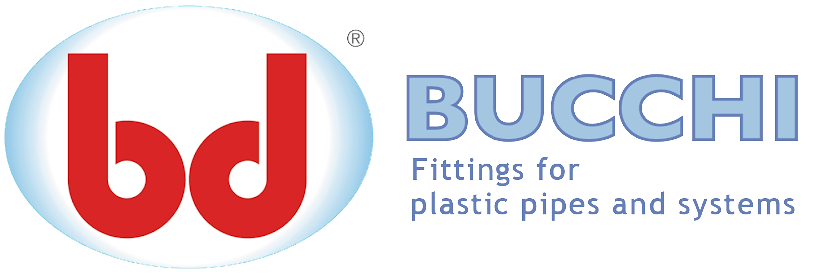Polymer or metal fittings: which to choose for your industrial system? When designing industrial, agricultural or original equipment systems, the choice of fittings is key to ensuring efficiency, safety and durability. One of the most strategic decisions concerns the material: are polymers or metal fittings better?
Both solutions have advantages and critical issues, but what really makes the difference is the correct assessment of the specific needs of the application. In this article, we explore the main features of each option to help you make an informed choice, thanks also to the technical support of a reliable partner such as Bucchi.
Polymers fittings: lightness, chemical resistance and customisation Polymers fittings, or more precisely technopolymer fittings, are now a high-performance solution for many industrial sectors. Their success is due to a combination of technical and economic factors that make them ideal for a wide range of applications.
Here are four advantages of technopolymer fittings:
1. Lightweight and easy to install
Technopolymer fittings are lightweight, which makes them easy to transport, handle and install, even in complex systems or areas that are difficult to access. This reduces operating times and costs.
2. Excellent chemical resistance
Technopolymers such as polypropylene (PP), nylon PA66 or acetyl resin (POM) offer high resistance to corrosion and aggressive fluids such as solvents, acids or fertilisers. This makes them particularly suitable for the chemical, agricultural and food industries.
3. Versatility and customisation options
Thanks to advanced production processes, technopolymer fittings can be made to measure, with customised geometries and technical specifications based on the application. Bucchi, for example, develops specific solutions for complex systems or extreme operating conditions, supporting customers with co-design and application testing services.
4. Competitive cost and durability
Compared to metal, plastic often has a lower cost, especially when considering the product's life cycle. This is important because durability in corrosive environments and reduced maintenance requirements contribute to significant long-term savings.
Metal fittings: mechanical strength and application limits
Metal fittings have always been a popular choice in many industrial applications, especially where high mechanical performance is required. However, their use also has certain limitations, particularly in terms of weight, chemical resistance and design flexibility. Let's take a look at them together:
1. High mechanical and thermal resistanceThe main strength of metal fittings is their robustness, which makes them ideal for high-pressure or high-temperature systems where very high structural resistance is required. Materials such as stainless steel, brass or aluminium guarantee reliable performance in extreme conditions.
2. Greater weight and installation complexityHowever, the weight of metal fittings compared to technopolymer fittings can be a problem, especially in systems where lightness is an operational advantage. In addition, these fittings often require specific tools and greater attention during assembly, resulting in increased installation time and costs.
3. Susceptibility to corrosionAlthough some metals are treated or naturally resistant to corrosion, exposure to certain chemicals or environmental agents can compromise the durability of the fitting. In sectors where chemical compatibility is essential, plastic can be a safer and more reliable option.
4. Limited design flexibilityMetal processing involves constraints in the creation of complex shapes or customised solutions. In contrast, engineering polymers allow greater design freedom, facilitating the development of complex geometries and fully customised solutions.
Polymers or metal fittings? Applications that make the difference
The choice between plastic or metal fittings depends heavily on the application context and specific operating conditions. Each material clearly has characteristics that make it more suitable for certain uses, and knowing these differences is essential to ensure efficiency, durability and safety. Therefore, a thorough understanding of the context of use is key to making the right choice: each application has specific requirements, and only a careful technical analysis can guide you towards the ideal fitting.
When to choose technopolymer fittings
Technopolymer fittings are the ideal solution in all contexts where lightness, chemical resistance and ease of installation represent a competitive advantage:• Corrosive fluid treatment plants: plastic materials offer superior chemical compatibility compared to metals.• Agriculture and irrigation: lightness, ease of maintenance and resistance to atmospheric agents make them perfect for this type of application.• Environments with a risk of metal corrosion: saline, humid environments or those with aggressive substances require materials that do not oxidise or deteriorate over time
When to choose metal fittings
Metal fittings are suitable for high-load applications or in extreme environments where mechanical properties must be at the highest level:• High-pressure or high-temperature systems: here, the strength and thermal stability of metal are essential.• Oil & gas sector: the highly technical and regulated environment requires superior, certified components.• Automotive and heavy industry: structural strength and durability make metal the most reliable choice.
Final thoughts: the right choice starts with your needs and your partner
Choosing between plastic or metal fittings is never an absolute decision, but a technical assessment that must consider numerous factors such as the type of fluid, operating conditions, mechanical and environmental stresses. Every system has specific requirements, and the best solution is always the one that best responds to the actual context.
That is why Bucchi is not simply a supplier of technopolymer components and fittings, but a reliable technical partner for fluid connection and conveyance solutions.
At Bucchi, we support manufacturers with personalised advice, application testing and tailor-made development to ensure the optimal choice in terms of performance, durability and safety.
Thanks to over 50 years of experience and a constant commitment to design and material selection, Bucchi technopolymer fittings now offer performance that rivals that of metal in many industrial applications. Lightweight, durable and technologically advanced, our connection solutions are the strategic choice for modern, efficient and durable systems.
Find out more about our solutions.
Read more 




.jpg)
